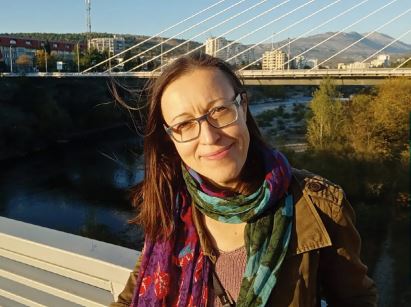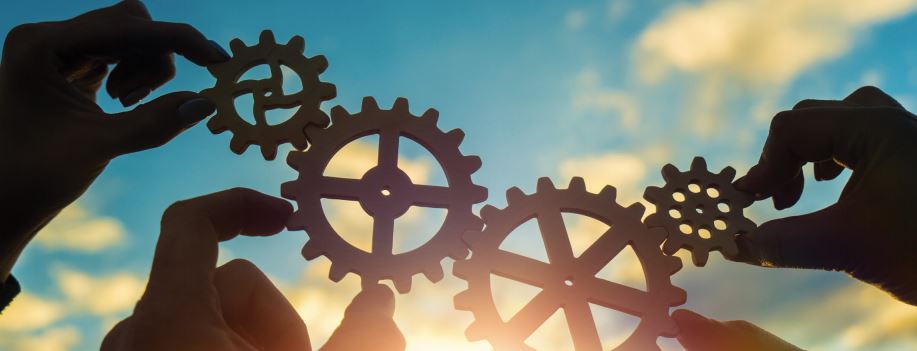From the Western Balkans with love - MCAA Magazine News January 2021
Since conditions for doing research in this region are not always ideal, researchers from the Western Balkans need to be flexible, interdisciplinary and creative. So says Dr Radenka Krsmanović Whiffen, who tells us how the research environment in the Western Balkans has helped to shape resilient and adaptable researchers.
Dr Radenka Krsmanović Whiffen, in her own words
I was born and raised in Montenegro and studied Electrical Engineering at the University of Montenegro. Subsequently, I completed my Masters at ISUFI, the University of Salento and graduated with a PhD in Physics at EMAT, the University of Antwerp.
After several years working in Material Science across the European research space, including in Serbia, France, Portugal and Italy, I was awarded an MSCA Individual Fellowship in Physics in 2018, for my project NanoPyroMat, investigating nanomaterials for pyroelectric energy harvesting at the ENEA Casaccia Research Centre in Rome. I am the chair of the MCAA Western Balkans Chapter which I helped found in 2019. Alongside my research interests, I try to focus on representing MCAA members in and from our region, promoting Open Science and RRI, and exploring the impact of science policy and regional cooperation as pathways to delivering systemic change and improvement in the research culture, both in the Western Balkans and beyond.
There is something to be said for being left to “work it out for yourself”. Radenka Krsmanović Whiffen, chair of the MCAA Western Balkans Chapter, says others across Europe could benefit from the experience of Western Balkan researchers having to navigate winding and unusual career pathways.
In an interview, Krsmanović Whiffen explains why building a career when your starting point is the Western Balkans is not always simple or straightforward.
“Science and research” is one of the negotiating chapters of the European Commission’s latest Communication on enhancing the accession process for the Western Balkans. In your opinion, and based on personal experience, how can a focus on science and research support the region’s accession to the EU?
Science and research are areas where cooperation and collaboration are the cornerstones of success. Researchers are thus generally aware of the importance of working together, whether at a regional or international level, in order to build opportunities and achieve results. That is not to romanticise researchers as somehow being “selfless.”
We also benefit from the opportunities we receive from that cooperation. We do, however, have a different perspective on the two-way nature of the process of integration.
In the context of the process of EU accession, which is of course at different stages in the different territories of the region, researchers can act as ambassadors for EU praxis and values, pointing to the ways in which embedding those values, including the importance of cooperation through for example Horizon 2020 projects, can enhance the prospects of accession. That need for cooperation has only been reinforced by the daily experience of the challenges of COVID-19. We cannot find all the answers alone. Cooperation at a global level is clearly the way forward.

Where does the region’s biggest strength lie, when it comes to research and innovation? Which qualities of the research environment in the Western Balkans could the rest of Europe learn from?
The biggest strength of the region is its people. We have always produced excellent researchers, and we have always exported them to other regions of the world due to lack of opportunities at home. That causes a paradox, because this process of brain drain creates a fantastic science diaspora which is innovative, collaborative, and deeply embedded in the research culture of Europe or America, but which has comparatively little influence on the research space in their home region.
To be frank, those who leave often don’t come back. That’s not because they don’t want to. In fact, they would often like to, for reasons of family ties and a desire to help build something better at home. More often than not, however, the opportunities to return are limited, due to structural issues with academia and research across the region. This is something that we need to acknowledge if we want to promote and speed up sustainable change. I recently finished my IF and decided to come back to Montenegro, not least because of the situation with COVID, so I know first-hand how difficult it is to reintegrate and communicate the value of an “outside” perspective.
The value of the research environment in the Western Balkans comes in shaping resilient and adaptable researchers. Conditions for doing research in our region are not ideal, even at the best institutions. What that means, though, is we have researchers who can do a lot with only minimal support, and who flourish sometimes even despite the environment they work in rather than because of it. In my experience, this tends to make researchers from the Western Balkans very flexible, interdisciplinary and creative. There is a lot to be said for being left to work it out for yourself, and sometimes I think the rest of Europe could benefit from our experience of navigating winding and unusual career pathways. Building a career when your starting point is the Western Balkans is not always simple or straightforward.
What is the biggest challenge faced by researchers in the region?
In simple terms, it’s the absence of opportunities. By that I mean both that there is a lack of opportunity to engage in cutting edge research in the region, for example, due to the absence of large-scale research infrastructure or limited investment, but also due to a lack of awareness of the opportunities offered by EU funding programmes like MSCA or Erasmus+. These are what I would call the “visible” barriers to research success in the region, and we at the Western Balkan Chapter aim to contribute to raising awareness of ways to overcome them.
There are also structural “invisible” barriers in our region, which are specific to the Western Balkans but which resonate with the experience of researchers in other “Eastern” regions, and I think more widely as well. To give just a few examples, in the Western Balkans, we have a very hierarchical system within academia and research, which closes off opportunities to people who don’t move in the right circles, or who have been away from the region and wish to return. The region as a whole also has a rather limited view of gender equality, which is much more declarative than substantive, meaning that career paths are designed by and for men, with little thought given to supporting women in research.
There is also a degree of corruption in academia across the region, both in terms of nepotism and “favours for favours,” but also a lack of commitment to academic integrity and Responsible Research and Innovation (RRI), which means that plagiarism is to some degree tolerated, while positions are awarded on the basis not of open, meritocratic competition, but rather processes which are specifically designed so that only “preferred” candidates will succeed. Even though there are mechanisms to combat this, there is a lack of will to really change the situation, and the daily experience of academic research in our the region reflects this. The greatest taboo is speaking up against these “unspoken” rules of the game, for fear of permanently marking yourself out as not welcome. We need more honesty about the problems if we are seeking to find solutions.
I realise this paints quite a gloomy picture, but we have to be realistic and say it how it really is. On the other hand, we should remember that there are lots of bright points in the region, where excellent researchers are producing ground-breaking research, and we should work to support and promote those practices which will help spread fairness and integrity more widely, so as to offer more opportunities to our talented researchers and, hopefully, improve the research culture over the long term.
The countries in the region are in different stages of the accession process. Does this affect research in the region and regional collaborations?
It’s absolutely correct that the stages of the accession process vary widely across the Western Balkans. We have long-standing candidates in Montenegro and Serbia, as well as two states that are about to start accession talks, Albania and North Macedonia, while Bosnia and Kosovo still have a long way to go. Each of those processes is moving at different speeds, and while the region as a whole benefits from the EU’s commitment to its European perspective, it is also clear that engagement and collaboration across the region is affected.
In terms of regional cooperation in research, we see that those candidates who have been in the process of accession for some time often find it easier to work together, or to create bilateral projects with existing EU member states, rather than build collaborations with other parts of the Western Balkans. The reasons for that are complex, but might include the available research infrastructure, the level of funding or the perception of prestige and added value. Research capacity and opportunities also vary considerably.
Which role can the MCAA Western Balkans Chapter play in boosting research in the region?
As I see it, we have two roles. The first is to be ambassadors for the opportunities offered by collaborative research across the European research space through the Marie Skłodowska- Curie Actions, and indeed more generally the other EU-funded programmes and opportunities that are available to the Western Balkans. MCAA members from our region have all benefitted from the opportunity to conduct innovative, collaborative and cutting edge research, and have compelling stories to tell about the impact of their experiences on themselves, their careers and their perspectives. As such, we can drive home the positive impact and practical benefits of engaging with EU research opportunities.
More generally, at least from my perspective, the Western Balkans Chapter has a responsibility to operate almost as a research lobby, both in the region and further afield, to promote RRI, equality of opportunity, academic integrity and fairness in research and academia, and to communicate the importance of science as part of society. All of us are proud of our roots, and we all want to see our home region doing well by expanding opportunities for everyone to showcase their talent. Where we see problems in our home societies, it is our job to talk about them openly, and to engage with other stakeholders, so that we can work together to tackle them and change our region for the better.
The Western Balkans has had a turbulent history, one which has an often negative impact on how the region is perceived by the wider world. In that context, science can play a diplomatic role at the level of bringing people together to share perspectives and seek mutually beneficial solutions. The Western Balkans Chapter is proof that we are better and stronger when we work together and speak with a unified voice to connect and represent our members. That’s our mission, and we hope by doing that we can contribute to offering a different, positive perspective and boost the status of research and researchers at a local, regional and international level.
MCAA Editorial Team
